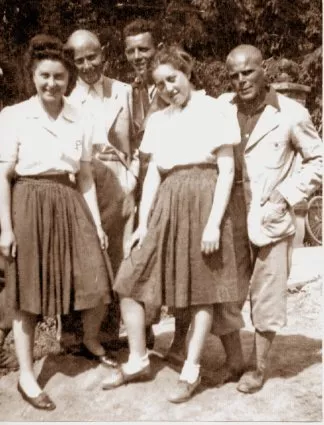This is a photo taken before the deportation, in Covasna. I am the first from left, and my sister Edit is near me, but unfortunately I don’t remember who the others were. The photo was taken in the 1940s in front of the house we lived in at the time, but it wasn’t our old house anymore, that is why I don’t remember the others: they might have been neighbors.
From 1942 to 1944 we stayed in Covasna. It was a so-called house arrest, that's what we had, forced residence, until the police deported us. And nothing bad happened to us in Covasna, we just had house arrest and that was all. But my brothers, Emil and Francisc, who had been drafted in the army before we left for Budapest, were brought back to Covasna and then again they were taken in the army. They weren't soldiers, they were in the fatigue parties, at forced labor for Jews. That was in 1942.
I had found a job in the meantime, at a lawyer, on the black market, who hired me as a secretary and typist, and who gave me a salary better than the one the county chief had, it was such a salary he gave me between 1942 and 1944. He knew that we were in an extraordinarily difficult situation and he had a lot of money, he collected a lot of money, and he trusted me and let me and not some other employee - because he had two more employees - handle the pay office; he trusted me and wanted to help me. He sometimes paid a fine for me, every month, to his friend, the county chief, so that I could remain in his service, because I was a Jew. He was an extraordinarily kind man. After the war ended, he went to Sweden.
We had just one nuisance in Covasna. We shared our old house in Covasna with a kindergarten teacher, but she was a big Hitlerite, an elderly woman. There were two apartments, they lived in one apartment and we lived in the other. But she was so ill willed, she caused quite a row, said that we didn't leave her alone there…and she went and complained until she had us kicked out of the house. But my father had a friend, a lawyer, whose mother had a big house, and he said: 'move to my mother's and live there in peace'. So we moved there.
Before we were deported from Covasna, my friend Clara wanted to go to a woman who predicted the future. This happened a month before the deportation (we left in May 1944), in April she said, 'let's go to that woman to see our future'. 'No, I don't want to know the future', I said. It was like I felt the future wouldn't be good, although I didn't think it would turn out like that, the thought of me being deported never crossed my mind. But still we went to that woman, I don't think she was a gypsy, she was a Hungarian, and she told some things to Clara and then she said: 'let me guess for the young lady as well' (that was me), 'no, I don't need that' - I didn't really want her to read in my palm - 'it's alright', she said, 'don't pay me, but let me see all the same', the woman wanted to foretell the future. She had some bean pods and she read in them, and she grew all sad and said: 'I won't say a lot'. She said: 'you are a large family', and she had never met me before, 'you are a large family, eight people', she guessed from the beginning that we were eight people, and that wasn't something to be known easily, because my brothers were never home, they had been in the army for a long time, 'eight people, but you will all be in 16 places', that's what she said, I will never forget that. It meant that we would be scattered and that we wouldn't know about each other and I didn't forget that in the concentration camp or anywhere else: it happened exactly like that woman said it would.









